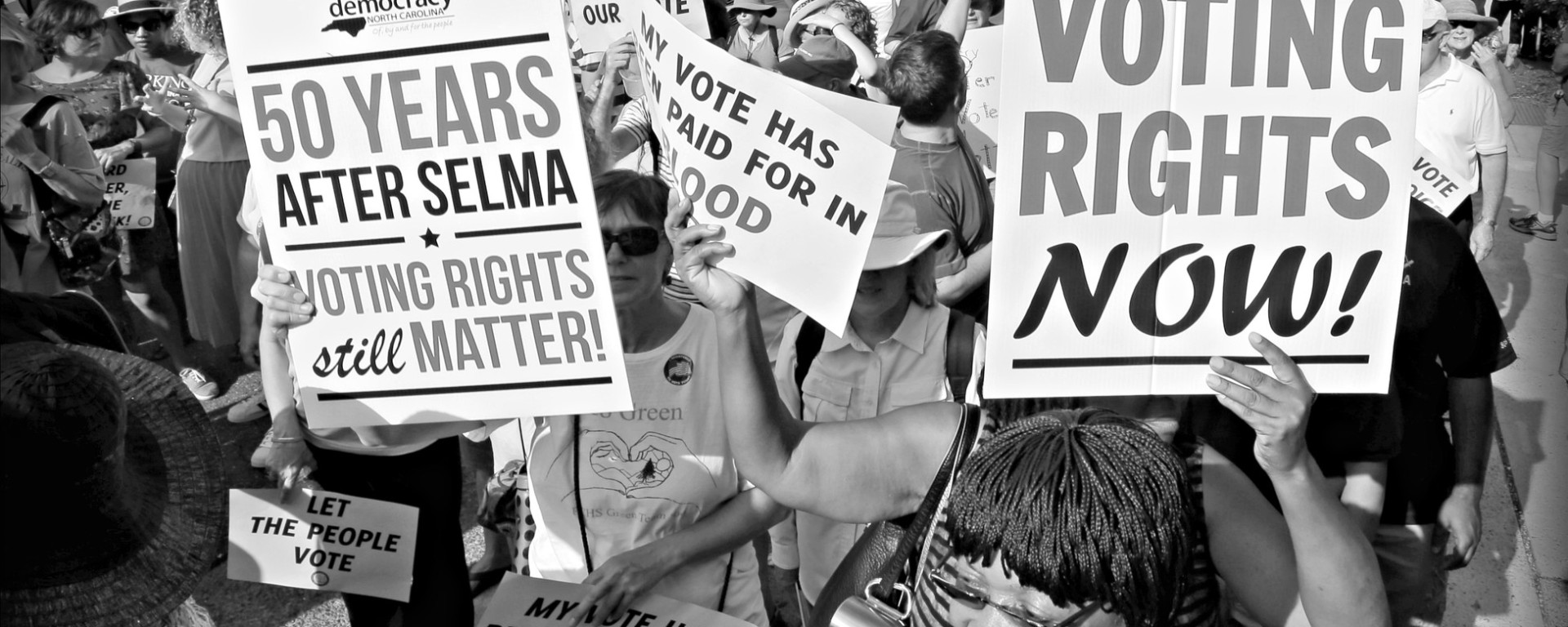“The right of citizens of the United States to vote shall not be denied or abridged by the United States or by any State on account of race, color, or previous condition of servitude.” (U.S. Const. amend. XV, §1.)
“The right of citizens of the United States to vote shall not be denied or abridged by the United States or by any State on account of sex.” (U.S. Const. amend. XIX.)
“The right of citizens of the United States, who are eighteen years of age or older, to vote shall not be denied or abridged by the United States or by any State on account of age.” (U.S. Const. amend. XXVI, §1.)
These are rights guaranteed by the Constitution. So why are so many American citizens still disenfranchised today?
Just a few weeks ago, on August 6, 2021, people across the country celebrated the 56th anniversary of the passage of the Voting Rights Act. Made possible by the unmatched courage of civil rights leaders like John Lewis, Hosea Williams, and Martin Luther King, Jr.—and signed into law by former President Lyndon B. Johnson—this comprehensive piece of legislation guaranteed for the first time what the 15th Amendment failed to: enfranchisement for Black Americans.[1]
Yet 56 years later, people—and disproportionately people of color—are still falling victim to legalized voter suppression tactics. State legislatures across the country have passed legislation purging voter rolls and requiring people to re-register, prohibiting the distribution of food and water to voters waiting in line, and restricting both early voting and voting by absentee ballot—to mention just a handful.[2] While these tactics vary in form, they produce the same end result: disproportionate disenfranchisement of marginalized communities. In 2021 alone, more than 389 bills with restrictive voting provisions have been introduced in at least 48 states.[3] As of mid-June, at least 28 of those bills had been signed into law.[4]
So, why? Shouldn’t the Voting Rights Act automatically void these voter suppression laws?
The answer to that question lies in the Supreme Court’s decision in the case of Shelby County v. Holder (2013). In this pivotal voting rights case, the Court struck down a key part of the 1965 Voting Rights Act that required states with histories of voter suppression to seek official authorization (usually by the Attorney General or a DC District Court) before enacting changes to their election laws and procedures. To be clear, the Court did not rule that such a practice was unconstitutional; it ruled that the formula for determining which states would be subject to the practice was outdated and no longer applicable. Effectively, the Court tasked Congress with devising new criteria for similar authorization—which to this day has still not happened.[5]
All hope is not lost, however. Congress has before it now two pivotal pieces of legislation that could pave the way for a future where no citizen is denied the right to vote. The For the People Act and the John Lewis Voting Rights Enhancement Act would modernize American elections by preventing monetary corruption and partisan gerrymandering, and restore the lost provisions of the Voting Rights Act, respectively.[6][7] Both measures have passed the House but face opposition in the Senate, where the decades-old and infamous filibuster proves an obstacle to voting rights activists’ ambitions.[8]
As a country, we should be collectively working to make it easier for people to vote—not harder. This shouldn’t be a partisan issue. The right to vote is not—or at least should not be—a topic of debate. The right to vote is not a matter of partisan politics. The right to vote is not a controversial subject.
The right to vote is a cornerstone of our democracy.
We have the tools, the infrastructure, the legislation, and the ability to ensure that every eligible American citizen has an opportunity to cast their ballot on election day.
So, I’ll ask again: why are so many Americans still disenfranchised today?
Citations:
[1] “Selma to Montgomery March.” Stanford University Martin Luther King, Jr. Research and Education Institute, kinginstitute.stanford.edu/encyclopedia/selma-montgomery-march. Accessed 9 Aug. 2021.
[2] “2021 Round-Up: Efforts to Restrict Voting in the States.” Democracy Docket, 21 May 2021, http://www.democracydocket.com/2021/05/voting-round-up-2021/. Accessed 9 Aug. 2021.
[3] “Voting Laws Roundup: May 2021.” Brennan Center for Justice, 28 May 2021, http://www.brennancenter.org/our-work/research-reports/voting-laws-roundup-may-2021. Accessed 9 Aug. 2021.
[4] Alas, Horus. “Report: Republican-Led State Legislatures Pass Dozens of Restrictive Voting Laws in 2021.” U.S. News and World Report, 2 Jul. 2021, http://www.usnews.com/news/best-states/articles/2021-07-02/17-states-have-passed-restrictive-voting-laws-this-year-report-says. Accessed 9 Aug. 2021.
[5] “Shelby County v. Hoyer.” Oyez, http://www.oyez.org/cases/2012/12-96. Accessed 9 Aug. 2021.
[6] Weiser, Wendy, et al. “Congress Must Pass the ‘For the People Act.’” Brennan Center for Justice, 29 Jan. 2021, http://www.brennancenter.org/our-work/policy-solutions/congress-must-pass-people-act. Accessed 9 Aug. 2021.
[7] “Text – S.4263 – 116th Congress (2019-2020): John Lewis Voting Rights Advancement Act.” Congress.gov, Library of Congress, 22 July 2020, http://www.congress.gov/bill/116th-congress/senate-bill/4263/text. Accessed 9 Aug. 2021.
[8] Berman, Russell. “The Democrats’ Dead End on Voting Rights.” The Atlantic, 22 Jun. 2021, www.theatlantic.com/politics/archive/2021/06/democrats-senate-voting-rights/619269/. Accessed 9 Aug. 2021.
Images:
Burton, Chuck. Voting rights’ protestors hold signs. AP, 2015, http://www.theatlantic.com/politics/archive/2015/08/give-us-the-ballot-expanding-the-voting-rights-act/399128/. Accessed 9 Aug. 2021.
“President Lyndon B. Johnson signs the Voting Rights Act of 1965 in a ceremony in the President’s Room near the Senate Chambers on Aug. 6.” AP Photo, 6 Aug. 1965, http://www.politico.com/story/2017/08/06/lbj-signs-voting-rights-act-aug-6-1965-241256. Accessed 9 Aug. 2021.
Wong, Alex. “A rally to support the For the People Act in Washington.” Getty Images, 21 Jun. 2021, http://www.nytimes.com/2021/06/21/us/politics/senate-voting-rights-bill.html. Accessed 9 Aug. 2021.


Brooke, as expected, this is an absolutely phenomenal work on the voting suppression. The parallels you draw from history to the present day are clearer than ever ahead of the midterms elections on the horizon. Thank you for sharing this work, and I look forward to reading what you have next!
LikeLike